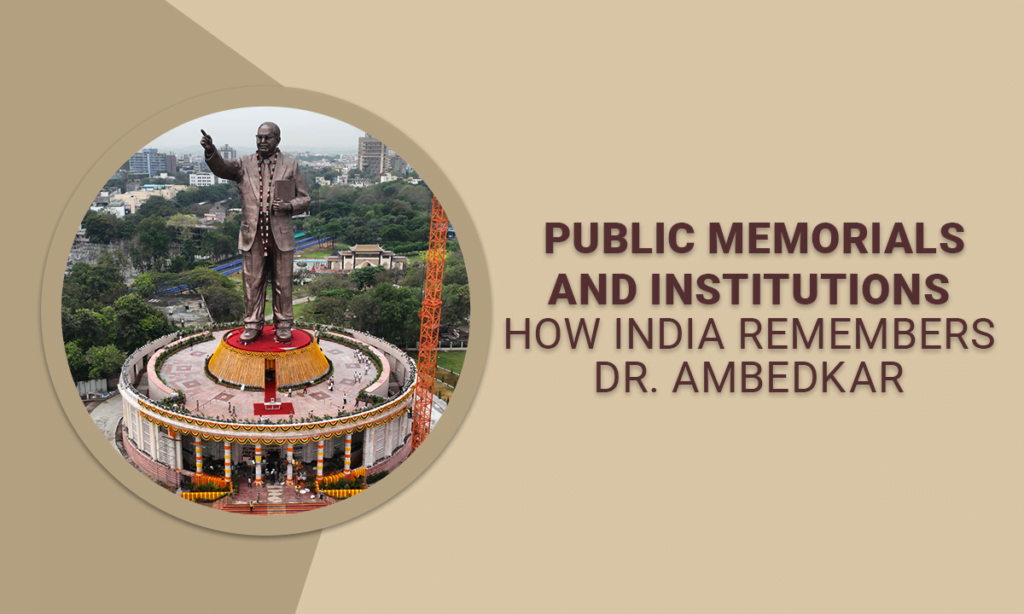Dr. B.R. Ambedkar, the chief architect of the Indian Constitution and a prominent social reformer, continues to be an iconic figure in India’s history. India has erected numerous public memorials and institutions dedicated to Dr. Ambedkar to honour his legacy. This post explores these memorials and institutions and their significance in preserving the memory of the man referred to as the “Father of the Indian Constitution.”
Chaitya Bhoomi
Located in Mumbai, Chaitya Bhoomi is perhaps the most famous memorial dedicated to Dr. Ambedkar. This monumental stupa marks the spot where Dr. Ambedkar’s ashes were interred after his passing in 1956. Every year, on December 6th, the day of his death, thousands of people, including prominent political leaders, pay their respects at Chaitya Bhoomi. The site also features a museum that chronicles Dr. Ambedkar’s life, achievements, and the struggles he faced.
Dr. Ambedkar Memorial Park
Another significant memorial is the Dr. Ambedkar Memorial Park in Lucknow, Uttar Pradesh. Inaugurated in 2008, this sprawling complex covers over 107 acres and is adorned with statues, sculptures, and architectural wonders that depict Dr. Ambedkar’s life and teachings. The park serves as a symbol of his enduring legacy and his impact on India’s social and political landscape.
Dr. Ambedkar National Memorial
The Dr. Ambedkar National Memorial in New Delhi is where Dr. Ambedkar lived during his tenure as India’s first Law Minister. It was here that he worked tirelessly on drafting the Indian Constitution. The memorial includes a museum that showcases his personal belongings, documents, and photographs, providing visitors with a deeper understanding of his life and work.
Dr. Ambedkar’s Birthplace Memorial
Dr. Ambedkar’s birthplace in Mhow, Madhya Pradesh, has also been converted into a memorial in his honour. The site features a statue of Dr. Ambedkar, along with information about his early life and struggles. It serves as a poignant reminder of his humble beginnings and his rise to become a towering figure in Indian history.
Educational Institutions
Some of the notable educational institutions established in Dr. Ambedkar’s name include:
Dr. B.R. Ambedkar University, Delhi
Dr. Ambedkar Institute of Technology, Bangalore
Dr. Ambedkar National Law University, Jabalpur
Dr. Babasaheb Ambedkar Open University, Ahmedabad
Dr. Ambedkar Memorial Centre, Mumbai
Dr. B.R. Ambedkar Chair, University of Hyderabad
Dr. Ambedkar Chair, Indian Institute of Technology, Delhi
Dr. Ambedkar Chair, Jawaharlal Nehru University, New Delhi
These institutions offer undergraduate, postgraduate, and doctoral programs in various fields, including law, economics, social sciences, and humanities. They also conduct research on a wide range of topics related to social justice, equality, and the eradication of caste-based discrimination.
Final Words
Dr. B.R. Ambedkar’s contributions to India’s social and political landscape are immeasurable. The public memorials and institutions dedicated to him serve as more than just physical structures; they are symbolic representations of his unwavering commitment to social justice and equality.
A Special Note from the Sankalp Bhoomi Trust
Since 2006, the Sankalp Bhoomi Trust has organised and celebrated Sankalp Day. This year marks the world’s historic 107th Sankalp Diwas, which will take place on September 23, 2023, and will be presided over by Ayushman *Shri Anil Pratham, IPS, DGP Gujarat.
This year, the Sankalp Bhoomi Trust will declare a series of resolutions to foster positive change. Our resolutions aim to create a more inclusive and equitable India. Here are the key resolutions that Sankalp Bhoomi Trust will be implementing:
1 Constitution is the ideal religion in India to live in harmony.
2 Opening of branches in each district of India.
3 Short course of the Sankalp Bhoomi Trust to be imparted to maximum citizens in India.
4 Work to associate or merge willing organisations with Sankalp Bhoomi Trust.
5 Identifying objective leaders and promoting them.
6 Coordinate and ensure decision-making authorities of all departments and institutions to implement policies and decisions as per the Constitution.
7 Coordinate and ensure companies comply with corporate social responsibility (CSR)
We invite you to join us in making a difference on this historic 107th Sankalp Diwas. Together, we can work towards building a more inclusive and equitable India.
